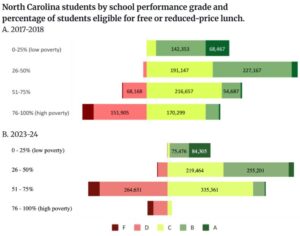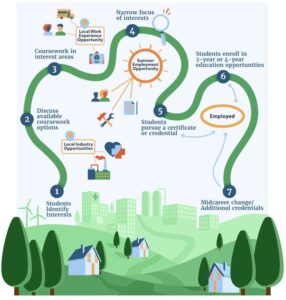The Importance of STEM Opportunities
They didn’t expect to find lead in the drinking water.
But that’s what UNC E3P chair Dr. Drew Coleman and a pair of summer 2022 interns from Robeson Early College High School discovered. The students had come to Dr. Coleman’s lab for a week-long environmental research project, learning how to collect and analyze water samples. Their results: elevated lead levels in several campus drinking fountains. In the years since, UNC has detected elevated levels in more than 125 buildings across campus and is in the process of updating water use procedures, repairing pipelines, and installing purifying water fountains.
This is just one powerful example of science making an impact on people’s lives. For students and early career researchers, these types of discoveries do more than reveal the unknown: they illustrate what science can do for us. Pre-college STEM programs (PCSPs) can help shift students’ perspectives from seeing science as a course to viewing it as a tool for informing and protecting communities.
In PCSPs, students not only learn from scientists, they become scientists themselves.
Access Disparities Across NC
Despite North Carolina’s reputation as an R1 powerhouse in both high level research funding and production, especially within the Research Triangle, the pathways into STEM remain uneven across the state. According to a National Center for Education Statistics report from 2021, 50% of rural high schools offer Advanced Placement (AP) STEM courses, with less than 30% of their 11th- and 12th-graders enrolled in those courses. This is compared to over 76% of urban schools offering AP courses, and nearly 50% of enrolled AP students.

For reference, of the over 1.5 million North Carolina high school students, nearly 48% attend schools in rural and small town communities, and roughly 35% are experiencing high poverty rates. From 2017-18 to 2023-24, EducationNC (EdNC) data underscore that educational inequities persist (Figure 1), as schools serving students experiencing poverty remain concentrated among the lowest performing schools, while low-poverty schools continue to earn higher performance scores. This persistent gap is likely influenced by a combination of systemic and institutional factors, underscoring the need for further research to understand and address the underlying causes.
While there has been an increase in school STEM performance across North Carolina, rural and high-poverty schools often face chronic shortages of certified STEM teachers and limited resources for up-to-date materials and equipment. If North Carolina wants to continue leading in innovation, it must invest not only in research infrastructure, but also in the human infrastructure that sustains curiosity. That means expanding opportunities for high schoolers and supporting rural partnerships.
STEM Opportunities for Students!
The result of this patchwork of opportunities is that the resources aren’t accessible for the students who need them most. Some students have access to fully funded or paid research internships and training, while others can only participate in programs that require paid tuition, travel, or unpaid work. A 2025 compilation of formal pre-college STEM programs within North Carolina shows that the majority of programs are concentrated within the Research Triangle and Charlotte regions, leaving large swaths of the state (particularly in Appalachia and the coast) underserved.
Across North Carolina, educators and scientists are working to host and promote programs that make research tangible, local, and inclusive to students. Here’s a look at ten of the state’s leading initiatives (in no particular order) spanning paid internships, free camps, and tuition-based summer academies.
| WinSPIRE Summer Research Program (UNC-Chapel Hill) | ||
| Cost | Paid internship | Each summer, WinSPIRE brings ~12 high school students into UNC research labs. Paired with student and faculty mentors, they spend 20 hrs/week learning lab techniques, data analysis, and science communication; with the other 20 hrs/week in college preparation and career development workshops and seminars. The program aims to address disparities in STEM by fostering curiosity and confidence. |
| Duration | 6 weeks (nonresidential program) | |
| Audience | Rising 11th and 12th grade | |
| North Carolina DNA Day | ||
| Cost | Free | Each spring, graduate students and postdoctoral fellows from UNC-Chapel Hill, Duke University, NC State, and East Carolina University travel across the state to celebrate North Carolina DNA Day, a one-day outreach event that connects scientists with classrooms to talk about genetics, genomics, and the nature of scientific research. |
| Duration | 1 day (late April) | |
| Audience | 9th-12th grade classrooms statewide | |
| Shadow a Scientist (UNC-Chapel Hill) | ||
| Cost | Free | Shadow a Scientist provides an accessible entry point for students unable to commit to longer programs. Participants spend a day following real scientists in action—observing experiments, asking questions, and seeing how research unfolds in real time. It removes logistical barriers while providing authentic exposure to lab life. |
| Duration | 1 day | |
| Audience | 7th-12th grade | |
| UNC-PRIMES (Program For Research In Image Processing And Machine Learning For Emerging Scholars) | ||
| Cost | Free (no-cost residential) | The UNC-PRIMES offers a hands-on summer research experience, featuring short courses and practical training in network neuroscience, machine learning, and image processing in cutting-edge Alzheimer’s disease research. This immersive program is designed to equip participants with computational skill sets to tackle real-world challenges in medicine, research, and industry. |
| Duration | 8 weeks (hybrid, 2 weeks in person) | |
| Audience | 9th-12th grade | |
| Geo-Health Summer Internship Program | ||
| Cost | Free (no-cost residential) | Geo-Health interns connect with and learn from scientists who live and work in North Carolina; engage with other high school students interested in Earth science or STEM; investigate the natural world through fun field trips and hands-on activities; and prepare for a job, career, or college degree in STEM. |
| Duration | Multi-week | |
| Audience | Robeson County 12th grade and early college students (18 years or older) | |
| UNC Charlotte C-STEM Pre-College Program | ||
| Cost | Free or low-cost; some competitive scholarships | UNC Charlotte’s C-STEM Pre-College Program supports sustained engagement through Saturday academies, summer camps, and competitions. Rather than offering a single experience, C-STEM builds long-term relationships between mentors and students, helping them envision themselves in technical careers. |
| Duration | Year-round (Saturday Academies & Summer Programs) | |
| Audience | K–12 students | |
| STEP-UP to STEM (ECSU, NCSSM, UNC-Pembroke) | ||
| Cost | Free (no cost residential) | The STEP-UP to STEM programs directly addresses inequity. Through small group research projects and mentorship, students explore topics in engineering, medicine, and data science. The program’s explicit mission is to empower students who are “historically underrepresented in STEM” to see themselves as future scientists. |
| Duration | 1 week | |
| Audience | Rising 9th and 10th grade | |
| NC State University Pre-College STEM Programs | ||
| Cost | Most require registration fees ($350–$1,200); some offer scholarships | NC State offers a diverse portfolio of pre-college STEM experiences, from the Engineering on the Road initiative to residential programs like Young Investigators in Nuclear Engineering. While not all are free, many provide financial assistance. These programs focus on hands-on design, coding, and data-driven research — key entry points into university-level science. |
| Duration | Varies (one-day to multi-week) | |
| Audience | 7th-12th grade | |
| NCCU’s Biomanufacturing Research Institute and Technology Enterprise (BRITE) Programs | ||
| Cost | Free | At North Carolina Central University, the BRITE program blends biotechnology, manufacturing, and mentorship. Students participate in hands-on lab work, learn biomanufacturing techniques, and gain professional development. Programs include field trip visits and a two-week summer immersion experience. |
| Duration | Varies (one-day to two-weeks) | |
| Audience | 11th and 12th grade | |
| The Scientific Research and Education Network (SciREN) Triangle | ||
| Cost | Free | SciREN is a program connecting researchers around the triangle to educators in NC by creating lesson plans for K-12 teachers based on their research. This culminates in a one-day networking event between researchers and educators each fall at the NC Museum of Natural History in Raleigh. |
| Duration | Classroom lesson plans | |
| Audience | K-12 students and educators | |
Advice for Students Interested in STEM
For career researchers and academics in STEM, their education and training paths are rarely linear. However, they all begin with the same spark; curiosity about how the world works. As a student, identify what fascinates you, and seek out any opportunity to learn more about it. See Figure 2 for insights on what a potential path could look like for you.
This exploration of opportunities includes coursework provided at your school or online, as well as talking with teachers, counselors, and mentors about local and nationally organized teams (e.g. organizations, communities, or youth chapters). Take chances on hands-on experiences such as volunteering, internships, or summer research programs. Show your commitment through consistent effort and by stepping into increasing levels of engagement, leadership, and responsibility. Along the way, connect with your peers, mentors, and professionals.
Even if a job or project isn’t exactly what you envisioned, bring curiosity, kindness, and your best effort to it. North Carolina has a thriving network of educators, researchers, and community leaders who are eager to support you and genuinely want to see you succeed.
Ultimately, success in STEM isn’t defined by your final destination. It’s found in the growth, discovery, and community you build along the way.
